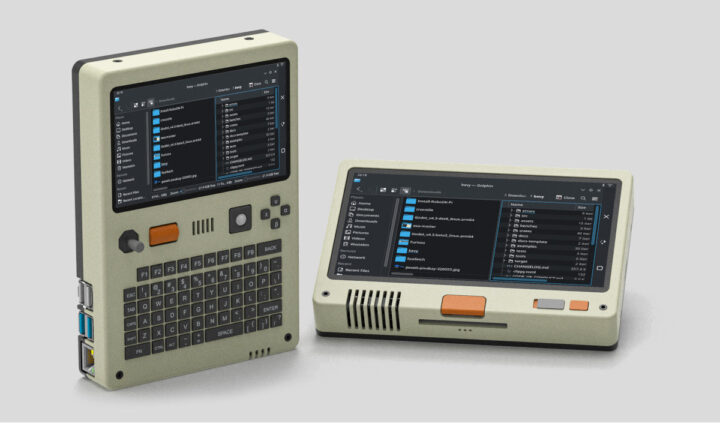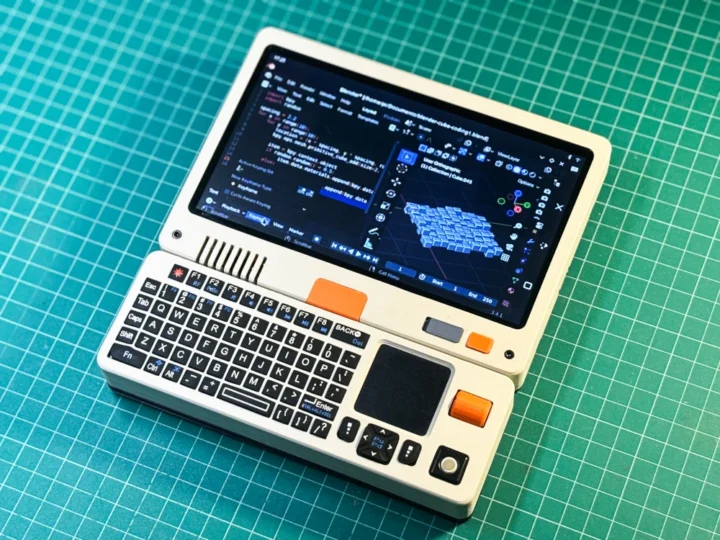Pilet is a modular, open-source hardware, portable computer designed for the Raspberry Pi 5 SBC, and equipped with a choice of displays, keyboards, and an optional battery module that can last for up to 7 hours.
Two models are available: the Pilet 5 with a 5-inch display, an integrated keyboard, a trackball, a scroll wheel, a navigational switch (D-Pad), and game buttons, and the Pilet 7 with a larger 7-inch display and support for detachable modules such as a keyboard, gamepad, or deck.

Pilet specifications:
- Supported SBC – Raspberry Pi 5
- Storage – MicroSD card, NVMe SSD via module
- Display
- Pilet 5 – 5-inch IPS MIPI DSI display with 1280×800 resolution, capacitive touch screen.
- Pilet 7 – 7-inch IPS MIPI DSI display with 1280×800 resolution, capacitive touch screen.
- Video Output- 2x micro HDMI ports
- Networking
- Gigabit Ethernet RJ45 port
- 802.11ac WiFi 5 and Bluetooth 5.0
- Optional LTE cellular via module
- USB – 2x USB 3.0 ports, 2x USB 2.0 port
- User control
- Pilet 5 – Touchscreen, Keyboard, trackball, scroll wheel, D-Pad, and game buttons (A,B,X,Y)
- Pilet 7 – Touchscreen, a few buttons, optional detachable modules for keyboard, gamepad,
- Expansion – 40-pin GPIO header on Raspberry Pi 5
- Power Supply
- 5V via USB-C port
- Supports 3.7V Lithium Polymer and Lithium-Ion Batteries
- Optional 2x 8,000mAh LiPo battery module lasts up to 7 hours
- Dimensions – 175 x 125 x 28mm
- Weight – TBD

Software support is a little confusing. We’re told the Pilet 7 runs KDE Plasma by default. But the Pilet is also compatible with several Linux distributions and works out of the box with Raspberry Pi OS with only a few tweaks required for the battery and display. Soulscircuit is also working on Pilet OS, a custom-optimized operating system built specifically for Pilet.
The project will be open-source hardware with the KiCad schematics and PCB layout, 3D files, firmware (e.g. QMK firmware for the keyboard), software, and documentation for the Pilet scheduled to be released on GitHub (no empty) following the product’s release. The hardware will be licensed under CERN-OHL-S, while the software will be released under a GPL license.
Potential applications for the Pilet Raspberry Pi 5 portable mini-computer include HMI (e.g. for home automation), a Linux terminal, a retro-gaming control, a STEM education platform, and if your eyes are good enough, a terminal to code on the go.
Soulscircuit has just launched the Pilet on Kickstarter and raised over $300,000 US in less than a day. Rewards start at about $202 US for the Pilet 7 and $219 US for the Pilet 5. These include an NVMe module (SSD HAT+) and the battery pack ($42), LTE module ($56), and 512GB SSD ($60) are available as options. Remember, you’ll also need your own Raspberry Pi 5 SBC. Backers should expect their rewards to ship by July 2025 if everything goes according to plan, at which time the resources for the project will also be made available on GitHub.

Jean-Luc started CNX Software in 2010 as a part-time endeavor, before quitting his job as a software engineering manager, and starting to write daily news, and reviews full time later in 2011.
Support CNX Software! Donate via cryptocurrencies, become a Patron on Patreon, or purchase goods on Amazon or Aliexpress




